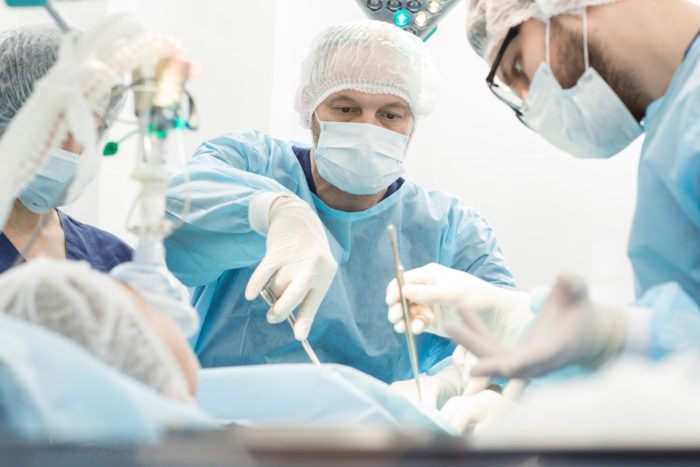Contents:
- Medical Video: Reducing Colorectal Cancer Risk Through Diet
- Various colon cancer treatment options
- 1. Surgery for early stage colon cancer
- 2. Surgery for invasive colon cancer
- 3. Surgery for advanced colon cancer
- 4. Chemotherapy
- 5. Radiation therapy
- 6. Targeted drug therapy
Medical Video: Reducing Colorectal Cancer Risk Through Diet
Plans for treating colon cancer must consider several factors, such as the type and stage of cancer, cancer sensitivity to certain hormones, and the patient's medical history. Treatment plans usually involve surgery to remove cancer. Some types of chemotherapy (drug therapy) or radiation therapy are often recommended to help the success of surgery. This treatment is known as adjuvant therapy or neoadjuvant therapy. This therapy as a whole aims to improve the rate of recovery and long-term survival of patients.
Various colon cancer treatment options
1. Surgery for early stage colon cancer
If your cancer is small, located in a polyp, and the stage is still very early, your doctor may be able to completely remove your cancer with a colonoscopy. Larger polyps can be removed using endoscopic mucosal resection. If the pathologist determines that the cancer can be completely removed, then no additional treatment is needed.
Polyps that cannot be removed in a colonoscopy can be removed using laparoscopic surgery. In this procedure, the surgeon will perform the operation through several small incisions in the abdominal wall, inserting the equipment with the camera to bring up a picture of your large intestine on the video monitor. He can also take samples from lymph nodes in the cancer location area.
2. Surgery for invasive colon cancer
If your colon cancer has invaded into or penetrated the large intestine, the surgeon may recommend partial colectomy to remove the portion of the large intestine containing the cancer, along with the normal tissue margin on each side of the cancer. The closest lymph nodes are usually also removed and tested for cancer.
The surgeon is often able to reconnect the healthy portion of the large intestine or rectum. However, at that time it is not possible, for example if the cancer is in the rectal outlet, you may need to undergo a temporary or permanent colostomy. This includes making entry into the abdominal wall from the remaining intestine to excrete body waste into a special bag. Sometimes the colostomy is only temporary, providing an opportunity for the large intestine or rectum to recover after surgery. However, in some cases, a colostomy can be permanent.
3. Surgery for advanced colon cancer
If your cancer is very severe or your overall health is classified as very bad, the treatment of colon cancer that may be most recommended is surgery to remove blockages in the large intestine or other conditions to relieve your symptoms. This operation is not done to cure cancer, but to relieve signs and symptoms, such as bleeding and pain.
In special cases where the cancer has spread only to the liver, and if your overall health is good, your doctor may recommend surgery to remove cancer lesions from your liver. Chemotherapy can be used before or after this type of surgery. This treatment can improve your prognosis.
4. Chemotherapy
Chemotherapy uses drugs to destroy cancer cells. Chemotherapy for colon cancer is usually given after surgery if the cancer has spread to the lymph nodes. In this way, chemotherapy can help reduce the risk of cancer recurrence.
Chemotherapy can also relieve symptoms of colon cancer that has spread to other areas of the body. Chemotherapy can be used before surgery to shrink the cancer before surgery. In patients with rectal cancer, chemotherapy is usually used in conjunction with radiation therapy.
5. Radiation therapy
Radiation therapy uses powerful energy sources, such as X-rays, to kill cancer cells that may remain after surgery, to shrink the tumor before surgery so that it is easier to lift, or relieve symptoms of colon cancer and rectal cancer.
Radiation therapy is rarely used in early stage colon cancer, but is a routine part of the treatment of rectal cancer, especially if the cancer has penetrated the rectal wall or spread to the closest lymph nodes. Radiation therapy, which is usually combined with chemotherapy, can be used after surgery to reduce the risk of recurrence in the area of the rectum where cancer begins.
6. Targeted drug therapy
Medicines that target specific disabilities that enable cancer growth are available for people with advanced colon cancer, including bevacizumab (Avastin), cetuximab (Erbitux), panumumab (Vectibix) and regorafenib (Stivarga). Targeted drugs can be used together with chemotherapy or independently. Targeted drugs are usually ordered for advanced colon sufferers.
Some people are helped with targeted drugs, while others are not. Researchers are still working to determine who is most likely to benefit from targeted drugs. Until the answer is found, doctors will carefully consider the limited benefits of targeted drugs against the risk of side effects and expensive costs when deciding whether to use this treatment.
Hello Health Group does not provide medical advice, diagnosis or treatment.












